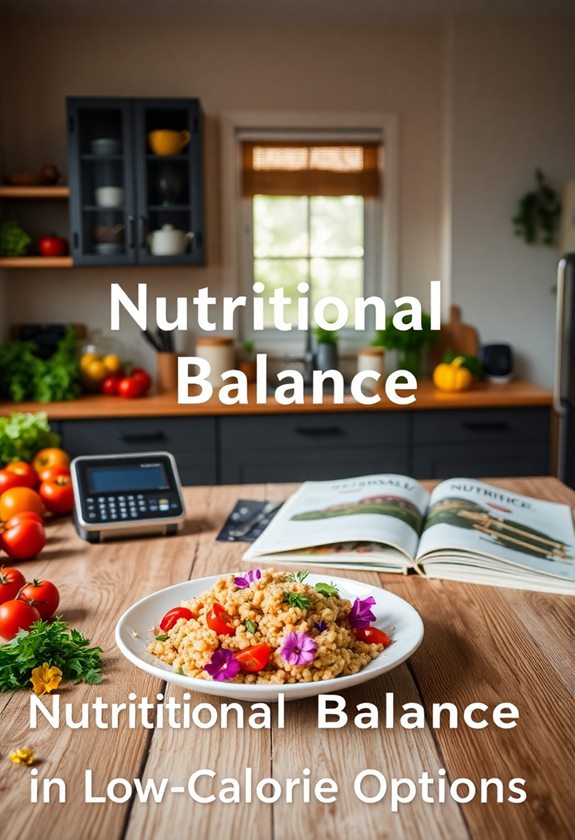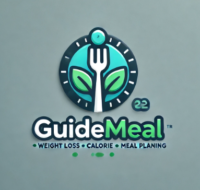Choosing low-calorie plans for weight control can be a game changer for you! By cutting down on calories, you can lose weight while still enjoying tasty, nutrient-rich foods like fruits and lean proteins. 🙌 Have you noticed how much more energized you feel when you eat well? Plus, you'll boost your mood and confidence as you start to see results. Think of Sarah, who lost 30 pounds just by sticking to wholesome meals. Low-calorie eating isn't just about losing weight; it's about feeling great overall. Curious for more tips on making this plan work for you? There's plenty more to explore!
Key Takeaways
- Low-calorie plans create a calorie deficit, promoting weight loss and enhancing motivation through visible progress.
- They prioritize nutrient-dense foods, ensuring essential nutritional needs are met while reducing calorie intake.
- Structured meal planning streamlines diet management, making it easier to reach and maintain weight control goals.
- Incorporating a variety of colorful foods improves meal appeal and ensures a balanced intake of macronutrients.
- Long-term habits formed through enjoyable low-calorie eating foster sustainable lifestyle changes and overall health improvement.
Understanding Low-Calorie Plans

When you consider a low-calorie plan, it's essential to understand its fundamental principles. These plans focus on reducing your daily calorie intake while still providing the nutrients your body needs. To make meal prep easier and more effective, using color-coded and icon-coded systems can help with food identification and portion control. But how do they work? Think of it as a way to create a calorie deficit. By eating fewer calories than you burn, your body starts to use stored fat for energy.
You might wonder, "Isn't it hard to stick to a low-calorie plan?" It can be, but it doesn't have to be! Start by choosing nutrient-dense foods like fruits, vegetables, lean proteins, and whole grains. These foods fill you up without packing on extra calories.
Also, don't forget about portion control. Have you ever noticed how easy it is to overeat? Measuring your portions can help you stay on track.
Benefits of Low-Calorie Diets
Low-calorie diets offer a range of benefits that can support your weight management goals and improve overall health. Have you ever found yourself struggling to shed those extra pounds? A low-calorie diet might be the solution you're looking for. By reducing your calorie intake, you can create a calorie deficit, which helps your body burn fat more effectively. Additionally, following structured meal plans, such as those found in Meal Prep for Weight Loss, can help streamline your diet and make it easier to reach your goals.
Here are some benefits you might enjoy:
- Weight Loss: You'll likely see results faster, boosting your motivation and confidence. Who doesn't love to feel lighter?
- Improved Energy Levels: With the right low-calorie foods, you can maintain your energy throughout the day. Don't you want to feel energetic and ready to take on your tasks?
- Better Health Markers: Lower calorie intake can lead to reduced blood pressure and improved cholesterol levels. Isn't it nice to think about your long-term health?
Nutritional Balance in Low-Calorie Options

How can you guarantee that your low-calorie diet remains nutritionally balanced? It's easier than you might think! Start by including a variety of food groups. This means you should focus on fruits, vegetables, whole grains, lean proteins, and healthy fats. Each group offers essential nutrients your body needs to function well. Incorporating structured meals can help regulate your metabolism and control hunger effectively.
Have you ever noticed how colorful plates look more appealing? That's not just for show! A mix of colors often means a mix of nutrients. For instance, leafy greens are rich in vitamins, while berries pack in antioxidants.
Don't forget about portion sizes, either. Eating too little can lead to nutrient gaps. For example, if you skip protein, you might feel tired and hungry soon after eating. Aim for a balance of macronutrients—carbs, proteins, and fats—in every meal.
Lastly, consider tracking what you eat. There are many apps that make this easy. They help you see if you're missing any nutrients. By staying aware, you can adjust your meals accordingly. Remember, a healthy diet doesn't have to be boring. With a bit of planning, you can enjoy tasty, low-calorie meals while staying nourished!
Easy Meal Planning Strategies
Planning your meals ahead can simplify your journey toward weight control and keep you on track. When you plan, you're less likely to grab unhealthy snacks or eat out without thinking. It's all about making choices that align with your goals. Have you ever noticed how much easier it is to stick to a plan when you know what's coming?
Here are three easy meal planning strategies you can try:
- Batch Cooking: Prepare larger portions of healthy meals on weekends. This way, you have quick options ready during busy weekdays.
- Use a Template: Create a simple meal template for breakfast, lunch, and dinner. For example, pick a protein, vegetable, and healthy carb to mix and match.
- Snack Smart: Plan your snacks too! Keep healthy options like fruits, nuts, or yogurt handy to avoid reaching for sugary treats.
Long-Term Sustainability

Achieving long-term sustainability in your weight control journey hinges on creating habits that fit seamlessly into your lifestyle. Think about it: can you stick to a plan that feels like a chore? Probably not! That's why low-calorie eating can work wonders when you make it enjoyable.
Start by finding foods you love that are lower in calories. Maybe you enjoy fresh fruits, roasted veggies, or lean proteins. Incorporate these into your meals regularly. When you're eating foods you like, it's easier to stay committed.
Next, consider your daily routines. Do you often grab fast food on busy days? Instead, prepare simple meals ahead of time that are both tasty and satisfying. Planning can save time and keep you on track.
Lastly, remember to celebrate small wins! Did you choose a healthy snack instead of chips? That's a victory! Recognizing these moments helps you feel motivated to continue.
In the end, it's about making small changes that fit your life. By doing this, you'll create a sustainable path toward your weight control goals, making it easier to maintain your success over time. 🌟
Psychological Benefits of Low-Calorie Eating
Low-calorie eating isn't just about trimming calories; it can also greatly boost your mental well-being. When you focus on healthier food choices, you may notice a positive shift in your mood and outlook. Have you ever felt lighter and more energetic after a healthy meal? This is because nutritious foods can enhance your brain's function, leading to better focus and improved mental clarity.
Here are some psychological benefits you might enjoy:
- Increased Confidence: As you see progress in your weight management, your self-esteem can grow. Feeling good about your choices can empower you.
- Reduced Stress: Eating healthier can lower stress levels. When you nourish your body, you might find it easier to cope with daily challenges.
- Better Mood: Low-calorie eating often means more fruits and vegetables, which can release feel-good hormones. You might just feel happier!
Success Stories and Testimonials

Many individuals have transformed their lives through low-calorie eating, sharing inspiring stories that highlight their journeys. Imagine stepping onto the scale and seeing a number that reflects your hard work! That's what many have experienced after starting low-calorie plans.
Take Sarah, for example. She lost 30 pounds in just a few months. By focusing on wholesome, low-calorie foods, she felt energized and confident. Isn't it amazing how food can fuel our bodies and spirits?
Then there's Mark, who not only shed weight but also reduced his cholesterol levels. He claims that low-calorie eating helped him feel healthier and more active. Don't you want to feel that way too?
These stories prove that change is possible. Each journey is unique, but the common thread is the commitment to a healthier lifestyle. You might be wondering if you can achieve similar results. The answer is yes! By embracing low-calorie eating and staying consistent, you can rewrite your story.

